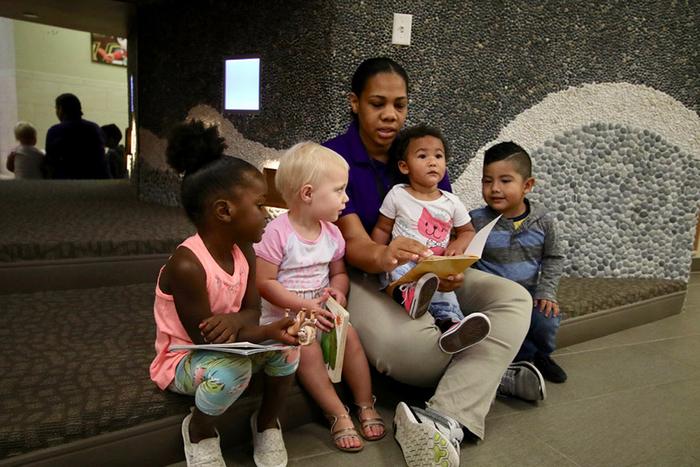OKLAHOMA CITY, OKLA. – OU researchers have received a $1.8 million grant from the U.S. Environmental Protection Agency to establish a research center to address children’s cumulative health impacts from agricultural and non-chemical exposures. This grant will create the Children’s Environmental Health Center in the U.S. Southern Great Plains, which includes Oklahoma and Texas. The Center will focus on mitigating the chemical and non-chemical stressors that affect school absenteeism caused by gastrointestinal and respiratory diseases.

Credit: Provided by the University of Oklahoma
OKLAHOMA CITY, OKLA. – OU researchers have received a $1.8 million grant from the U.S. Environmental Protection Agency to establish a research center to address children’s cumulative health impacts from agricultural and non-chemical exposures. This grant will create the Children’s Environmental Health Center in the U.S. Southern Great Plains, which includes Oklahoma and Texas. The Center will focus on mitigating the chemical and non-chemical stressors that affect school absenteeism caused by gastrointestinal and respiratory diseases.
This collaborative center will be under the direction of Changjie Cai, Ph.D., assistant professor in the Department of Occupational and Environmental Health in the Hudson College of Public Health on OU’s Health Sciences Center campus; Diane Horm, Ph.D., director of the Early Childhood Education Institute at OU-Tulsa; and Dan Li, Ph.D. from the University of North Texas College of Education.
Research has shown that children in underserved, rural, and agricultural communities face increased health risks due to the combination of agricultural pollutants in the air, water, and soil, as well as non-chemical stressors such as poverty and limited access to health services. This project addresses an urgent need to investigate the cumulative health impacts of chemical and non-chemical exposures for children in these communities to help keep children healthy.
“Our team will investigate the cumulative health impacts of early exposure to pollutants and the added effect of non-chemical stressors among children in these communities across the United States,” Cai said. “The goal of the Center is to reduce the environmental health disparities and promote environmental justice for children living in underserved, rural agricultural communities.”
Through a multidisciplinary approach, the center will use techniques such as low-cost sensors, satellite observations, air quality modeling and more to establish and evaluate impact assessments. Utilizing those results, affordable interventions will be assessed to reduce school absenteeism and address health disparities.
“At the Early Childhood Education Institute, it has always been our goal to advance and support equity for all children through research,” Horm said. “The opportunity to collaborate with Dr. Cai, Dr. Li, and others on this grant to establish the Children’s Health and Social Vulnerability Index (CHS) will allow us to better assess children’s health disparities in rural schools.”
The CHS will be stakeholder-and data-driven and will focus on children’s health disparities in rural school systems and focus on chemical and non-chemical stressors that lead to absenteeism in school due to gastrointestinal and respiratory diseases.
This research grant is part of EPA’s larger effort to advance children’s environmental health and environmental justice by effectively reducing early childhood and lifetime health disparities in these communities.
“This collaboration of OU researchers from various disciplines highlights OU’s commitment to supporting our faculty researchers so that they can deliver science-based recommendations to improve the lives of our youngest learners,” said Darrin Akins, vice president for research at the OU Health Sciences Center. “This research will have a strong focus on chemical and non-chemical environmental stressors that children in the Southern Great Plains face every day.”
Learn more about the Hudson College of Public Health and the Early Childhood Education Institute.
###
About the Hudson College of Public Health
The Hudson College of Public Health is located within one of the nation’s premier academic health centers, comprising seven professional colleges. Established in 1967, it stands as the sole accredited college of public health in Oklahoma and is nationally recognized, ranking No. 6 in the Top 10 Colleges for Public Health Degrees by College Magazine. The University of Oklahoma Health Sciences Center serves over 4,000 students across more than 70 undergraduate and graduate degree programs on campuses in Oklahoma City and Tulsa. As Oklahoma’s flagship comprehensive academic health system, it remains committed to education, research and patient care, shaping the future of health care.
About the Early Childhood Education Institute
The Early Childhood Education Institute (ECEI) at OU-Tulsa is an applied research institute with multiple ongoing projects designed to advance and support equity in early childhood programming and policies by generating and disseminating high-quality, meaningful research. This research is vital to ECEI’s partners and the early childhood field to drive improvements in early childhood education and improve the lives of the children it serves.
About the University of Oklahoma
Founded in 1890, the University of Oklahoma is a public research university located in Norman, Oklahoma. As the state’s flagship university, OU serves the educational, cultural, economic and health care needs of the state, region and nation. OU was named the state’s highest-ranking university in U.S. News & World Report’s most recent Best Colleges list. For more information about the university, visit www.ou.edu.




